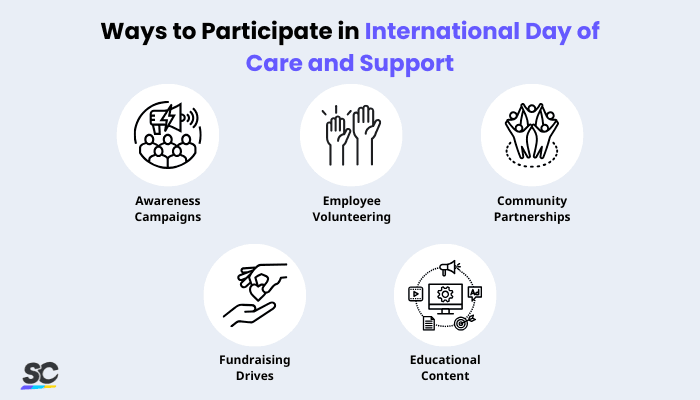International Day of Care and Support: How Organizations Can Get Involved
A look at the International Day of Care and Support, why it matters, and different ways for businesses to participate.

Published 10 Oct 2025
Article by
6 min read
What is International Day of Care and Support?
The International Day of Care and Support, observed every year on October 29, was established by the United Nations (UN) to recognize the essential role of both paid and unpaid care work. It aims to raise awareness about the importance of caregivers and to encourage investment in inclusive, gender-responsive care systems that support all individuals. The day also emphasizes that care and support work are fundamental to achieving sustainable development and gender equality worldwide.
Importance
The International Day of Care and Support has become increasingly important in the last few years as the global care industry continues to grow and influence economies, communities, and families. This observance highlights how unpaid and paid care work sustains societies and contributes significantly to economic growth and social stability. According to the World Economic Forum, unpaid care work alone would represent up to 9% of global GDP if compensated, showing how essential caregivers are to the world’s well-being and development.
Organizations should participate because they play a crucial role in promoting inclusive care policies, supporting caregivers in the workplace, and raising awareness about the value of care work. By engaging in this observance, companies and institutions can strengthen social responsibility, improve employee well-being, and contribute to a more equitable and sustainable society. Their involvement also helps drive broader systemic changes that ensure care and support are recognized as fundamental to human and economic progress.
Achieve operational excellence
Cultivate a culture of excellence with our digital solutions that enhance efficiency, agility, and continuous improvement across all operations.
Key Challenges in the Care Sector
A key reason the UN established the International Day of Care and Support is to raise awareness of the challenges that workers in the care industry face. Below are a few of the key challenges the care sector faces and why it’s important to raise awareness for these challenges:
Gender Inequality and Underinvestment
The care sector continues to face deep-rooted gender inequality, with women performing the majority of unpaid or underpaid care work globally. This imbalance limits women’s economic opportunities and reinforces social inequities. Raising awareness about the need for greater investment in care infrastructure and fair compensation is crucial to building a more inclusive and sustainable care economy.
Mental Health and Wellbeing
Care workers often face emotional exhaustion, burnout, and stress due to long hours, low pay, and limited access to mental health support. These challenges can lead to reduced quality of care and high turnover rates in the workforce. Highlighting mental health concerns helps advocate for better working conditions, support systems, and policies that protect the wellbeing of both caregivers and those they support.
Regulatory Landscape
The care sector often lacks consistent standards, clear regulations, and adequate oversight across countries and regions. This creates disparities in wages, working conditions, and access to training for care workers. Raising awareness about the need for stronger, fairer regulations ensures that care systems remain ethical, equitable, and effective in supporting growing global needs.
How Businesses Can Participate

Ways to Participate in International Day of Care and Support
Companies and organizations are free to participate in this yearly observance in any way they want. Any participation, whether it be providing volunteer opportunities or hosting awareness campaigns, can go a long way. Here are a few ideas for teams looking to participate in the International Day of Care and Support:
Host Awareness Campaigns and Events
Organizations can host awareness campaigns, webinars, or community events to highlight the value of care and support work. These initiatives help educate the public about the social and economic importance of caregivers while promoting respect and recognition for their contributions. With technology to streamline event management tasks, it also becomes easier to monitor the impact of company-wide efforts. By organizing such events, companies can inspire others to advocate for stronger care systems and gender equality.
Provide Volunteer Opportunities for Employees
Encouraging employees to volunteer at care facilities or community programs fosters empathy and social engagement within the workplace. It gives staff firsthand insight into the challenges caregivers face and strengthens organizational culture around compassion and inclusion. Supporting employee volunteerism also helps bridge gaps between corporate sectors and local communities, all while improving Corporate Social Responsibility (CSR).
Partner With Local Care and Support Organizations
Collaborating with local nonprofits, hospitals, or social service providers can amplify efforts to improve care access and quality. Partnerships allow organizations to share resources, expertise, and visibility to support ongoing initiatives in the care sector and improve organizational CSR efforts. These collaborations create long-term community impact and demonstrate genuine corporate commitment to social well-being.
Launch Fundraising or Donation Drives
In addition to establishing meaningful partnerships, companies can also organize donation or fundraising drives to provide essential resources to caregivers, care facilities, or families in need. Financial and material support can strengthen community care programs and help sustain vital services. Such efforts also showcase corporate solidarity with global goals that promote dignity and equality for all caregivers.
Share Educational Content on Care and Support Issues
Organizations can use their communication platforms to share articles, infographics, and videos that raise awareness about care and support challenges. Educational content, as well as mobile-ready training courses, helps inform audiences about topics like gender equity, mental health, and the importance of investing in care systems. By spreading accurate information, organizations play a key role in shaping positive public attitudes toward care work.
Improve Care and Support Practices with Technology
Technology plays a growing role in improving the quality, safety, and efficiency of care and support services. Organizations in the care sector should pay attention to digital tools that can streamline operations, reduce administrative burdens, and enhance the well-being of both caregivers and care recipients. By adopting the right technology, teams can deliver more consistent, reliable, and person-centered care.
There are now a variety of digital solutions that can help care teams strengthen their daily operations and maintain high standards of service. These tools improve coordination, accountability, and overall care quality through real-time access to information and automated workflows. Some tools today that can help improve care and support practices include the following:
Digital Checklists – Helps caregiving teams perform routine inspections, care procedures, and compliance checks with consistency and accuracy.
Training Modules – Provides ongoing, accessible learning programs to keep caregivers updated on the latest care protocols and best practices.
Communication Tools – Enables seamless coordination among staff members, supervisors, and healthcare professionals to ensure timely support.
Lone Worker Protection – Offers safety features such as GPS tracking and emergency alerts for caregivers working independently or in remote locations.
Analytics Dashboards – Delivers insights into care quality, staff performance, and resource allocation, helping organizations make data-driven improvements.
Secure Data Storage – Ensures that sensitive client information and care records are safely stored and comply with data protection regulations.
Enhance Care and Support Workflows with SafetyCulture
Why Use SafetyCulture?
SafetyCulture is a mobile-first operations platform adopted across industries such as manufacturing, mining, construction, retail, and hospitality. It’s designed to equip leaders and working teams with the knowledge and tools to do their best work—to the safest and highest standard.
Streamline processes, eliminate bottlenecks, enhance resource utilization, and build an agile and scalable infrastructure with SafetyCulture. Strive for operational excellence to boost competitive advantage, foster sustainable growth, and deliver long-term value.
Save time and reduce costs
Stay on top of risks and incidents
Boost productivity and efficiency
Enhance communication and collaboration
Discover improvement opportunities
Make data-driven business decisions
FAQs About International Day of Care and Support
Related articles
Operations
Business Processes

Implementing Value Management for Better Business Outcomes
Explore value management, its principles, benefits, and helpful strategies to drive peak performance and cost-efficiency.
Operations
Business Processes

A Guide to How Operations Automation Streamlines Workflows
Learn what operations automation is, which workflows require streamlining, and how it reduces errors to improve performance.
Business Processes
Operations

Yokoten: The Key to Quality Improvement
Get to know the basics of the Yokoten principle and how it accelerates continuous improvement by sharing known solutions across teams.